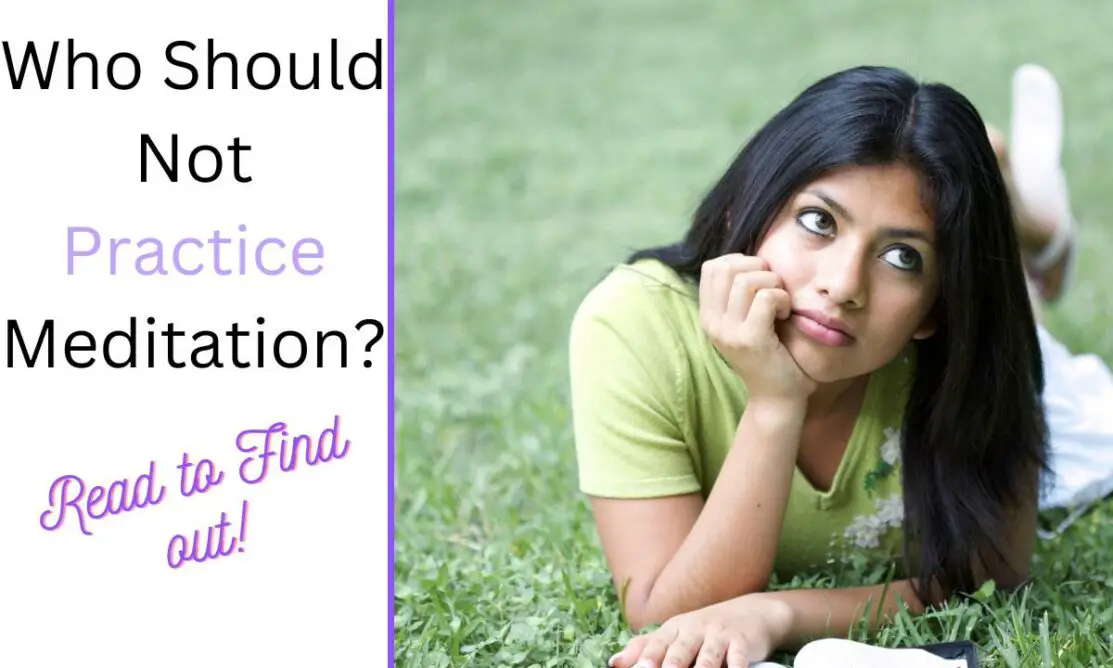Meditation is a powerful tool for relaxation, stress relief, and overall well-being.
However, it is not suitable for everyone.
People with certain mental health conditions, such as anxiety, depression, or psychosis, should not practice meditation without consulting a mental health professional first.
Additionally, people with certain physical conditions, such as high blood pressure, should also avoid meditation without consulting a doctor.
Finally, people who are prone to dissociation or have a history of trauma should also avoid meditation without proper guidance.
The Dangers of Meditation for People with Mental Health Conditions
Meditation can be a great way to relax and reduce stress, but it can also be dangerous for people with certain mental health conditions. While meditation can be beneficial for some, it can be harmful for others.
For people with anxiety, meditation can be a double-edged sword. On one hand, it can help reduce stress and anxiety levels.
On the other hand, it can also increase anxiety levels if done incorrectly.
People with anxiety should be careful when meditating and should consult with a mental health professional before starting a meditation practice.
People with depression should also be cautious when it comes to meditation. While it can help reduce stress and improve mood, it can also make depression worse if done incorrectly.
People with depression should consult with a mental health professional before starting a meditation practice.
People with bipolar disorder should also be careful when it comes to meditation.
While it can help reduce stress and improve mood, it can also trigger manic or depressive episodes if done incorrectly.
People with bipolar disorder should consult with a mental health professional before starting a meditation practice.
Finally, people with post-traumatic stress disorder (PTSD) should be especially careful when it comes to meditation.
While it can help reduce stress and improve mood, it can also trigger flashbacks and other symptoms of PTSD if done incorrectly.
People with PTSD should consult with a mental health professional before starting a meditation practice.
In conclusion, meditation can be a great way to relax and reduce stress, but it can also be dangerous for people with certain mental health conditions.
People with anxiety, depression, bipolar disorder, and PTSD should consult with a mental health professional before starting a meditation practice.

How Meditation Can Worsen Anxiety and Panic Attacks
Meditation is often touted as a great way to reduce stress and anxiety, but it can actually have the opposite effect for some people. For those who suffer from anxiety and panic attacks, meditation can actually worsen their symptoms.
When we meditate, we focus on our breath and try to clear our minds of all thoughts.
This can be difficult for those with anxiety, as they may find it hard to quiet their racing thoughts.
Trying to force yourself to meditate can actually increase your anxiety and make it harder to relax.
Another issue is that meditation can bring up suppressed emotions. When we meditate, we become more aware of our feelings and thoughts, and this can be overwhelming for those with anxiety.
If you’re not prepared to deal with these emotions, it can lead to an increase in anxiety and panic attacks.
Finally, meditation can be a form of exposure therapy.
This means that you’re exposing yourself to the very thing that causes you anxiety. This can be beneficial in the long run, but it can also be too much for some people.
If you’re not ready to face your fears, it can lead to an increase in anxiety and panic attacks.
If you suffer from anxiety and panic attacks, it’s important to be aware of the potential risks of meditation.
While it can be a great tool for reducing stress and anxiety, it can also have the opposite effect if you’re not prepared.
If you’re considering trying meditation, it’s best to speak to a mental health professional first to make sure it’s the right choice for you.
The Risks of Meditation for People with PTSD and Trauma
Meditation can be a great way to reduce stress and anxiety, but it can also be risky for people with PTSD and trauma. While meditation can be a powerful tool for healing, it can also be a trigger for those with PTSD and trauma. It’s important to understand the risks before you start meditating.
First, it’s important to understand that meditation can bring up difficult emotions. For people with PTSD and trauma, this can be especially challenging. When you meditate, you’re focusing on your breath and your body, which can bring up memories and feelings that you’ve been trying to avoid. This can be overwhelming and can lead to a feeling of being out of control.
Second, meditation can also be a trigger for flashbacks. Flashbacks are a common symptom of PTSD and trauma, and they can be triggered by anything that reminds you of the traumatic event. Meditation can be a trigger because it can bring up memories and feelings that you’ve been trying to avoid.
Finally, meditation can also be a trigger for dissociation. Dissociation is a common symptom of PTSD and trauma, and it can be triggered by anything that makes you feel disconnected from your body or your environment. Meditation can be a trigger because it can make you feel disconnected from your body and your environment.
It’s important to be aware of the risks of meditation for people with PTSD and trauma. If you’re considering meditation, it’s important to talk to your doctor or therapist first. They can help you decide if meditation is right for you and can provide guidance on how to do it safely.
Conclusion
In conclusion, meditation is not suitable for everyone. People who are prone to anxiety, have difficulty focusing, or have a history of mental illness should not practice meditation without consulting a mental health professional first. Additionally, those who are easily distracted or have difficulty sitting still may find it difficult to practice meditation. Ultimately, it is important to consult a mental health professional before beginning any type of meditation practice.



